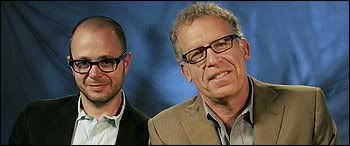
THEY GET 'LOST': Damon Lindelof, left, and Carlton Cuse.
"Lost" executive producers Damon Lindelof and Carlton Cuse may be the most interrogated men in America. The leaders of "Lost" -- the ABC sci-fi mind-bender that ends its run Sunday -- have spent the better part of six years being bombarded by questions about what's happening on the island. This weekend, they're expected to deliver answers. How are they coping with the pressure? We snagged Q&A time with them in New York and found out.
Are you worried about the finale and how people are going to respond to it? Or are you just trying not to think about it?
Cuse: I think we're actually kind of excited about it. We've known large parts of the finale for a long time and I think it's like we're finally going to get a chance to end the show and see how people respond to it. We're really proud of the finale.
On some level it's hard because how the audience reacts is kind of out of our control. What we can do is basically make the best version of the end of the show that we knew how to do. And we feel like we made the version of the finale we wanted to make.
After the last moment of the show, what would you say is the emotion most people are most likely to feel?
Cuse: I hope sadness. If you go to a movie and it's a great experience, the experience at the end of it is always like this sadness that it's over, that your time with these characters is finished.
Lindelof: There's two things that are going to happen when the show ends. The first feeling is going to be based on what you just watched, the actual content. And the other is the feeling that you have as a result of knowing that the show is actually over. And some people are going to confuse the two.
And I think one of the really brilliant things about "The Sopranos" [finale] as a storyteller is the artistry of it, which Carlton and I have talked about ad nauseum. Basically David Chase said: I'm going to take away from you the first feeling, which is that feeling of "The show's over. How do I feel about that?" -- and he replaced it with "What just happened? Did my cable go out? I'm a little surprised by this." So the idea that the show ended so abruptly, as opposed to, we moved out of the diner and he played the emotion of, ah, this is the final shot of "The Sopranos" -- this is what it is.
We did the exact opposite. We leaned into the emotion. And you know, we tried to take those two feelings and make them the same, which is that what you're watching on the screen is exactly the same as "The show is ending."
After the series ends, you're going into radio silence and not speaking publicly about the finale. Do you know what the statute of limitations on that silence will be?
Cuse: No
Lindelof: The interpretive element of "Lost," the fact that you immediately need as soon as the episode is over to seek out a community of people to express your own thoughts about it, understand what they thought about it and form an opinion, that's the bread and butter of the show. The more we talk about what our intention was, the more we take it away from the audience. And we have no interest in doing that, ever.










No comments:
Post a Comment